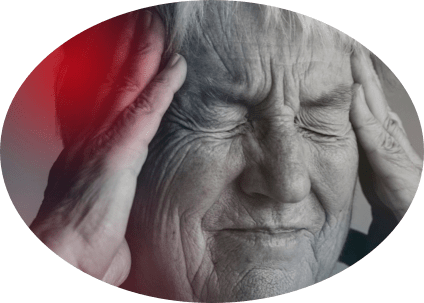Dementia
Dementia
Neurocognitive disorders (previously referred to as Dementia, Delirium, Amnestic, and Other Cognitive Disorders) are disorders that cause cognitive decline from previous functioning due an injury, neurodegenerative process (such as Parkinson’s Disease and Alzheimer’s Disease), or other medical cause. Neurocognitive disorders can occur at any time in the lifespan, such as in older adults (such as Alzheimer’s Disease presentations), as well as younger adults who might have experienced a head injury or other medical condition (such as post-COVID). Cognitive functioning can be impaired in a variety of ways, such as impairment in complex attention, executive function, learning and memory, language, perceptual-motor, and social areas. Some types of neurocognitive disorders are more short term (such as Delirium/sudden confusion), some could have a more rapid onset due to injury (such as TBI), and some types are more long term and can be degenerative in nature (such as Alzheimer’s Disease or Lewy Body Disease).
Cognitive impairment may range from mild to major and often causes behavioral, functional, and personality changes. It is important to have any cognitive changes evaluated by a specialist. Proper evaluation and treatment can help find answers to your or your loved one’s change in functioning. Ally Psychiatry offers neuropsychological evaluation, as well as psychiatric medication management and therapy services to patients suffering with possible neurocognitive disorders.
Dementia Symptoms
In its early stages, dementia can cause symptoms, such as:
Not coping well with change. You may have a hard time accepting changes in schedules or environment.
Subtle changes in short-term memory-making. You or a loved one can remember the events of 15 years ago like it was yesterday, but you cannot remember what you had for lunch.
Reaching for the right words. Word recollection or association may be more difficult.
Being repetitive. You may ask the same question, complete the same task, or tell the same story multiple times.
Confused sense of direction. Places you once knew well may now feel foreign. You may also struggle with driving routes you’ve taken for years because it no longer looks familiar.
Struggling to follow storylines. You may find following a person’s story or description difficult.
Changes in mood. Depression, frustration, and anger are not uncommon for people with dementia.
Loss of interest. Apathy may occur in people with dementia. This includes losing interest in hobbies or activities that you once enjoyed.
Confusion. People, places, and events may no longer feel familiar. You might not remember people who know you.
Difficulty completing everyday tasks. You may struggle to recall how to do tasks you’ve done for many years.
Memory problems are not always a sign of dementia. These 10 early signs may indicate you are experiencing a decline in memory and mental ability.
Dementia Symptoms
In most cases, dementia is progressive, getting worse over time. Dementia progresses differently in everyone. However, most people experience symptoms of the following stages of dementia:
Mild Cognitive Impairment
Older individuals may develop mild cognitive impairment (MCI) but may never progress to dementia or any other mental impairment. People with MCI commonly experience forgetfulness, trouble recalling words, and short-term memory problems.
Mild Dementia
At this stage, people with mild dementia may be able to function independently. Symptoms includes:
- Short-term memory lapses
- Personality changes, including anger or depression
- Misplacing things or forgetfulness
- Difficulty with complex tasks or problem solving
- Struggling to express emotions or ideas.
Moderate dementia
At this stage of dementia, people impacted may need assistance from a loved one or care provider. That is because dementia may now interfere with daily tasks and activities. Symptoms include:
- Poor judgment
- Increasing confusion and frustration
- Memory loss that reaches further into the past
- Needing help with tasks like dressing and bathing
- Significant personality changes
Severe Dementia
At this late stage of dementia, the mental and physical symptoms of the condition continue to decline. Symptoms include:
- inability to maintain bodily functions, including walking and eventually swallowing and controlling bladder
- inability to communicate
- requiring full-time assistance
- increased risk for infections
- People with dementia will progress through the stages of dementia at different rates.
Understanding the stages of dementia can help you prepare for the future.
Get Help Now
There is no need to suffer alone.
Find a mental health ally near you today.
We’ll walk alongside you as you discover true hope,
clarity and peace.



